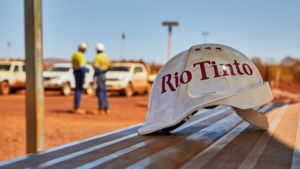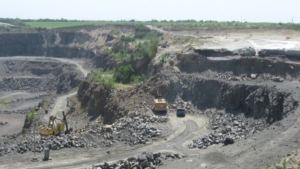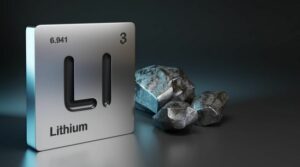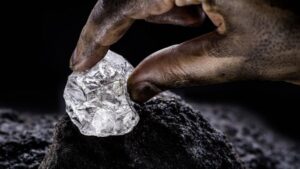
Rio Tinto Group has mothballed its $2.95 billion Jadar lithium project in Serbia, Bloomberg reported, according to the Serbian Economist.
The project will be transferred to “care and maintenance” mode in accordance with plans to simplify Rio Tinto’s asset portfolio and focus on more interesting opportunities in the short term, the document said.
A company spokesman confirmed to the agency the decision to mothball Jadar, which has large lithium-rich ore reserves.
The project, which never reached the production stage, faced many problems. The Serbian government has repeatedly changed its position on the issue of granting permits to develop the mine, which was strongly opposed by local communities.
“Given the lack of progress on the issue of permits, we can no longer maintain the previous level of expenditure and resource allocation,” the document said.
https://t.me/relocationrs/1742

During its spring offensive, Russian forces took control of one of Ukraine’s most promising lithium deposits — the Shevchenkivske site in Donetsk region. Previously under development by an American critical minerals company, the site was seen as a key asset in the growing economic partnership between Kyiv and Washington in the field of strategic resources. Its capture now poses serious risks to future joint projects and has already raised concerns among Western investors.
The Shevchenkivske deposit contains significant reserves of spodumene — a mineral from which lithium is extracted. Lithium is essential for manufacturing batteries used in electric vehicles and energy storage systems. Ukraine had earlier signed a framework agreement with the United States on cooperation in the field of critical raw materials, including the development of domestic lithium, titanium, and rare earth element extraction — crucial for the West’s green energy transition. The agreement envisioned attracting investment into Ukrainian subsoil resources. However, with Shevchenkivske now under Russian control, the feasibility of that cooperation is under threat.
Myroslav Zhernov, the director of the company holding the license for the site, confirmed the loss in a comment to The New York Times. According to him, the battle for the deposit lasted several weeks: “It was very hot. They were bombing with everything they had. And now they’re there.” Zhernov warned that this may not be the end: “If the Russians advance farther, they will control more and more deposits.”
The New York Times reports that signs of activity have already been observed on the occupied territory: an assessment of reserves is underway, and preparations for future extraction may be in progress. In this way, control over lithium could give the Kremlin not only military but also geoeconomic advantages. The article notes that Russia is already leveraging its influence in global raw materials supply chains, particularly in uranium markets.
Although Ukraine still possesses two other major lithium deposits in its western regions, Shevchenkivske was considered the most promising due to its high spodumene concentration — up to 90%. In peacetime, the development of this site could have become not only a source of revenue, but a strategic lever for integrating Ukraine into Western critical materials markets.
Former head of the State Service of Geology and Mineral Resources, Roman Opimakh, explained that such investments are subject to enormous risks during wartime: “Security and control over a deposit is the main prerequisite. The military threat scares away investors, and the loss of such a site effectively nullifies any near-term development plans.”
Observers note that the war is increasingly taking on characteristics of economic conflict. Russia is not only destroying infrastructure but is actively targeting resources that could be useful to itself or potentially strengthen Ukraine. Gaining control over lithium assets allows for pressure on Western corporations and contributes to reshaping global dependencies.
Despite the loss, Zhernov said his company is not giving up on investing in Ukraine and is exploring other options. However, he admitted the situation has fundamentally changed risk assessments: “Before, we saw this project as a driver of economic growth. Now — it’s just another front in the war.”
Earlier, the Experts Club information and analysis center produced a detailed video analysis of the prospects for rare earth element mining in Ukraine.

Ukraine is preparing to announce a tender for the development of the Dobra lithium deposit, which could become the first project within the framework of cooperation with the US, according to the head of the President’s Office, Andriy Yermak.
“Ukraine is preparing to announce a tender for the development of the Dobra lithium deposit in the Kirovohrad region. This could be the first project within the framework of cooperation with the US. I am glad to see that the process is moving forward and that the results of our meetings in Washington a week ago are turning into concrete actions,” Yermak wrote on Telegram on Wednesday.
For more details on the prospects for rare earth element mining in Ukraine, see the video from the Experts Club analytical center – https://www.youtube.com/watch?v=UHeBfpywpQc&t

According to recent geological exploration data, lithium reserves at the Polokhivske deposit (Kirovohrad region) exceed 760 thousand tons of lithium carbonate equivalent (760 LCE kt), and Ukraine has significant potential for its extraction, said Ksenia Orynchak, Executive Director of the National Association of Extractive Industries of Ukraine (NADPU), in a commentary to Interfax-Ukraine.
“According to the latest geological exploration data for the Polokhivske deposit, the reserves exceed 760 thousand tons of lithium carbonate equivalent,” she said.
According to her, this deposit, which belongs to Ukrlithium mining, is one of the largest in Europe.
Orynchak reminded that there are four explored lithium deposits in Ukraine. Polokhivske is the only explored one where the owner holds a mining license. The others are Dobra (also in Kirovohrad region), Shevchenkivske (Donetsk region) and Kruta Balka (Zaporizhzhia region), the latter two located in the temporarily occupied territories.
“It is a fact that Ukraine has significant lithium mining potential. According to reputable studies, we are among the top three countries in terms of reserves, along with the Czech Republic and Serbia. (…) Ukraine is very favorably located geopolitically for the European Union,” the NAPRU head said.
Orynchak also disagreed with the opinion of Yegor Perelygin, Chairman of the Board of UMCC-Titanium – United Mining and Chemical Company JSC, who recently criticized the prospects for the development of Ukrainian lithium deposits due to low world prices for lithium, its surplus, high production and processing costs, and the need for significant investment in the face of high risks in Ukraine.
Earlier, the National Academy of Sciences of Ukraine estimated that the country has about 500 thousand tons of lithium.

Demand for lithium, which is used to produce electric vehicle batteries, is likely to grow in the coming years, supporting prices that have fallen significantly in recent years, Market Watch reports, citing experts.
“Currently, the world does not produce enough lithium hydroxide to meet the demand driven by the growing popularity of electric vehicles,” said Austin Devaney, chief commercial officer of Piedmont Lithium Inc. Austin Devaney.
According to the International Energy Agency (IEA), the share of electric vehicles in total global vehicle sales last year was 14%. It more than tripled from 4% in 2020. In 2023, global sales of electric vehicles are expected to grow by 35% compared to the previous year.
Fundamental factors suggest that the global electric vehicle market will continue to grow, says Devani.
Meanwhile, the average price of lithium-ion batteries fell by 8.7% in August, falling below $100 per kWh for the first time since August 2021, according to Benchmark Mineral Intelligence. The price reached $98.1 kWh on September 6, which is 33% lower than the peak recorded in March last year – $146.4 kWh.
The global lithium surplus has increased this year compared to last, but S&P Global Commodity Insights expects it to decline over the next three years.
According to S&P Global Commodity’s forecast, this year’s market supply will amount to 990.065 thousand tons of lithium carbonate equivalent, while demand will be 928.717 thousand tons. As a result, the surplus of lithium will reach 61,348 thousand tons compared to 10,061 thousand tons in 2022.
In 2024, the oversupply will decrease to 43 thousand tons of lithium carbonate equivalent, in 2025 – to 11 thousand tons, in 2026 – to 3 thousand tons, and in 2027 a deficit of 8 thousand tons will be recorded, according to S&P Global Commodity.
After 2027, demand for lithium will exceed supply, Devani said, citing Benchmark Mineral Intelligence forecasts.
“We believe that the expected lithium shortage requires the US to increase production capacity and reduce dependence on other countries,” the expert says. The bulk of lithium raw materials used in the US are mined in Australia and South America, with 80% of these raw materials being processed in China, Devani said.
According to him, the total amount of announced investments in battery production capacity in the United States over the past two years amounted to approximately $80 billion. In order for these capacities to be utilized, the annual supply of lithium hydroxide in the United States should reach 715 thousand tons by 2030, which is more than 40 times higher than the volume currently produced in the country (approximately 17 thousand tons).
Devaney noted that his company plans to produce about 60 thousand tons of lithium hydroxide per year in the long term, which is expected to be enough for about 1.2 million electric vehicles per year.

UkrLithium Mining LLC (“UkrLithium”) intends to build a lithium mine in Kirovograd region in compliance with international environmental standards.
According to a company press release, management considered two options for mining lithium-containing ores in Kirovograd Region: open-pit (open-pit) and shaft method.
“We decided on the mine method because the environmental component is important for us. We want to be esg-friendly (environmental, social and corporate management),” explained the director of strategic development of “Ukrlitydobycha” Denis Alyoshin in an interview with “Business Telegraph,” which is quoted by the press service.
According to him, although Ukraine is not yet in the European Union, but the company believes that the country will be there in the next few years. Therefore, it performs all works according to the highest European standards. The mine method is much less harmful to the environment than open-pit mining.
“The mine will cost much more for the project investors, but this is the method we choose. We will dive about 600 meters deep into the deposit. The second stage will be the construction of an enrichment plant, where we will turn the ore into petalite concentrate,” Aleshin explained.
“Ukrlytiy has signed a contract with the British company Wardell Armstrong, which will conduct research ESIA (Environmental and Social Impact Assessment) – an international analogue of the Ukrainian environmental study OIA (Environmental Impact Assessment). It is necessary in order to make the project of the mine and the mining and processing plant in compliance with international standards on the environment. For this purpose a mini-meteorological station will be installed on the territory of the future construction, samples of soil, water, etc. will be collected. Within about a year and a half a study will be carried out, the results of which will give recommendations and conclusions in the form of an extensive report, exactly how to minimize the potential impact on the environment.
The press release specifies that in 2017 LLC “Ukrlitydobycha” acquired a special permit for the development of Polokhovsky lithium deposit in Kirovograd region. As of 2023, preparatory work for the construction of the mine and concentrator has been or is being carried out.
From 2018 to 2021 several drilling campaigns were carried out (a total of more than 5,000 meters). This allowed a geological evaluation of reserves in accordance with the international JORC code.
Contracts have been signed for a Pre Feasibility Study, which will be completed by the end of 2023.
Work has begun on the Environmental and Social Impact Assessment Study, which takes about 1.5 years.
Definitive Feasibility Study is planned for 2024 – the last stage of the research to substantiate the key technological, financial and economic parameters of the project.
According to the company’s website, the mine is expected to operate for 15 to 20 years with an anticipated annual production of up to 200,000 tons of petalite concentrate. The company is also exploring the possibility of building a lithium hydroxide/carbonate plant.
“Ukrlytium” will also produce about 1,100 thousand tons per year of lithium-bearing feldspar.